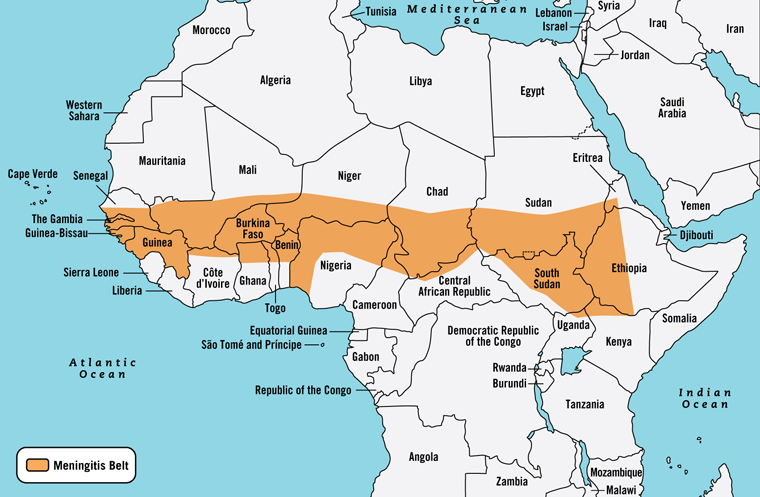MENINGITIS VACCINE
Welcome to the Meningitis section of the Washington Travel Clinic website. This page contains valuable information on the meningitis vaccine, as well as links to the CDC website where you can learn about current outbreaks.
The meningitis vaccine is available at the Washington Travel Clinic. Our fee structure is clearly posted in the Pricing section. For an easy online appointment, please click here. Also visit our Homepage for more information about the full spectrum of our services.
Travelers should get vaccinated against meningitis before visiting areas where meningitis occurs. The clinician’s decision whether or not to vaccinate any traveler must take into account the traveler’s risk of being infected with the meningitis bacteria and country entry requirements. The meningitis vaccine is administered in one dose and provides protection for 5 years.
For information on current outbreaks, consult CDC’s Travelers’ Health section.
About meningitis:
Meningitis is a disease caused by the inflammation of the protective membranes covering the brain and spinal cord known as the meninges. The inflammation is usually caused by an infection of the fluid surrounding the brain and spinal cord. Meningitis may develop in response to a number of causes, usually bacteria or viruses, but meningitis can also be caused by physical injury, cancer or certain drugs. The severity of illness and the treatment for meningitis differ depending on the cause. Thus, it is important to know the specific cause of meningitis. One such important cause is Neisseria meningitidis, a bacterium that is classified into 5 major groups associated with disease: A, B, C, Y, and W-135. N. meningitidis is found worldwide. At any time, 5%–10% of the population may be carriers of N. meningitidis without having symptoms.
The incidence of meningococcal disease is highest in the “meningitis-belt” of sub-Saharan Africa. The incidence of meningococcal disease is several times higher in the meningitis belt than in the United States, with periodic epidemics during the dry season, which runs from December to June. Although most common in the African meningitis belt, meningococcal outbreaks can occur anywhere in the world.
Young children have the highest risk for meningococcal disease, but 60% of cases occur in adolescents and adults. Risk is highest in travelers to the meningitis belt who have prolonged contact with local populations during an epidemic. The Hajj pilgrimage to Saudi Arabia has also been associated with outbreaks of meningococcal disease in returning pilgrims and their contacts.
Meningococcal disease generally occurs 1–14 days after exposure and presents as meningitis in ≥50% of cases. Meningococcal meningitis is characterized by sudden onset of headache, fever, and stiffness of the neck, sometimes accompanied by nausea, vomiting, photophobia, or altered mental status. Up to 20% of people with meningococcal disease present with meningococcal sepsis, where the bacteria are disseminated through the blood. This is characterized by an abrupt onset of fever and a rash caused by bleeding in the skin, and can progress to shock and death.
Early diagnosis and treatment are critical. Diagnosis is generally made by isolating N. meningitidis from the blood or from the fluid surrounding the brain via a spinal tap. Meningococcal disease is potentially fatal and should always be viewed as a medical emergency. Antibiotic treatment must be started early in the course of the disease.
Prevention of meningitis caused by Neisseria meningitidis:
The meningitis vaccine is recommended for people who travel to or reside in countries where N. meningitidis causes epidemics, particularly if contact with the local population will be prolonged. Epidemic regions include the meningitis belt of Africa during the dry season (December–June). Advisories for travelers to other countries are issued when epidemics of meningococcal disease caused by vaccine-preventable serogroups are recognized. Proof of receipt of vaccination against meningococcal disease is required for people traveling to Mecca during the annual Hajj and Umrah pilgrimages.
There are 2 types of meningitis vaccine available. One that contains serogroups A, C, Y and W-135, called “quadrivalent” meningitis vaccine, and one that contains serogroup B. The first is recommended for travelers. The second is recommended for individuals at risk of contracting type B meningitis, namely college students.






